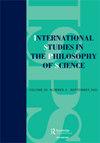走向意识与自我的中性结构主义理论
IF 0.8
2区 哲学
Q2 HISTORY & PHILOSOPHY OF SCIENCE
International Studies in the Philosophy of Science
Pub Date : 2022-07-08
DOI:10.1080/02698595.2022.2092825
引用次数: 1
摘要
最近,一个关于自我和意识的信息理论结构现实主义理论被提出(Beni, m.d. 2019)。建构自我:哲学与认知科学的一系列新方向。帕尔格雷夫麦克米伦)。该理论被认为是泛心论的一种形式。我反对这种解释,并表明贝尼的结构主义理论遇到了意识的难题,就像意识的综合信息理论一样。由于这两种理论都是结构主义的,并且都是以信息的概念为基础的,所以我建议使用集成信息论所采用的解决方案,即引入外在和内在结构和动态(内在信息和内在结构)的区别。对贝尼的结构主义意识理论进行这些形而上的改进,将使该理论有更好的机会克服这一难题。就意识的形而上学而言,它让我们超越了物理主义。因此,我建议将信息论的结构主义意识理论与中性的一元论本体论相结合,而不是泛心论和物理主义。这些重新工作可能会导致意识的自然主义解释的改进——意识和自我的中性结构主义理论。本文章由计算机程序翻译,如有差异,请以英文原文为准。
Towards a Neutral-Structuralist Theory of Consciousness and Selfhood
ABSTRACT Recently, an information-theoretic structural realist theory of the self and consciousness has been put forward (Beni, M. D. 2019. Structuring the Self, Series New Directions in Philosophy and Cognitive Science. Palgrave Macmillan). The theory is presented as a form of panpsychism. I argue against this interpretation and show that Beni’s structuralist theory runs into the hard problem of consciousness, in a similar way as the Integrated Information theory of consciousness. Since both of these theories are structuralist and based on the notion of information, I propose to use a solution that has been employed for Integrated Information Theory, namely introducing the distinction between extrinsic and intrinsic structure and dynamics (intrinsic information and intrinsic structure). Making these metaphysical enhancements to Beni’s structuralist theory of consciousness will give the theory a better chance of overcoming the hard problem. In terms of the metaphysics of consciousness, it takes us beyond physicalism. I then suggest that the information-theoretic structuralist theory of consciousness should, instead of panpsychism and physicalism, be combined with neutral monist ontology which is a better fit. These reworkings could lead to an improved naturalistic account of consciousness – the neutral-structuralist theory of consciousness and the self.
求助全文
通过发布文献求助,成功后即可免费获取论文全文。
去求助
来源期刊

International Studies in the Philosophy of Science
HISTORY & PHILOSOPHY OF SCIENCE-
自引率
12.50%
发文量
10
期刊介绍:
International Studies in the Philosophy of Science is a scholarly journal dedicated to publishing original research in philosophy of science and in philosophically informed history and sociology of science. Its scope includes the foundations and methodology of the natural, social, and human sciences, philosophical implications of particular scientific theories, and broader philosophical reflection on science. The editors invite contributions not only from philosophers, historians, and sociologists of science, but also from researchers in the sciences. The journal publishes articles from a wide variety of countries and philosophical traditions.
 求助内容:
求助内容: 应助结果提醒方式:
应助结果提醒方式:


